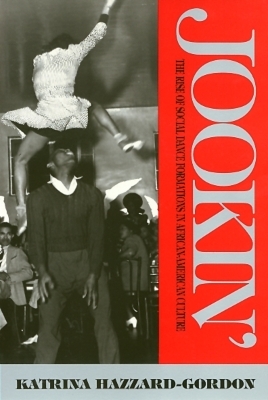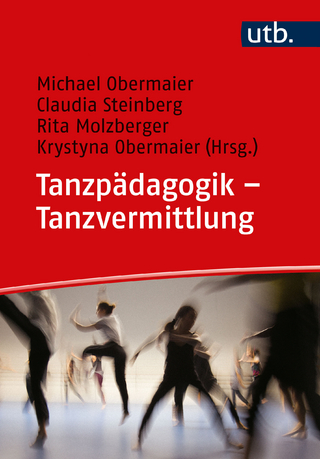
Jookin'
The Rise of Social Dance Formations in African-American Culture
Seiten
1992
Temple University Press,U.S. (Verlag)
978-0-87722-956-8 (ISBN)
Temple University Press,U.S. (Verlag)
978-0-87722-956-8 (ISBN)
The first analysis of the development of the jook and other dance arenas in African-American culture
Katrina Hazzard-Gordon offers the first analysis of the development of the jook—an underground cultural institution created by the black working class—together with other dance arenas in African-American culture. Beginning with the effects of African slaves’ middle passage experience on their traditional dances, she traces the unique and virtually autonomous dance culture that developed in the rural South. Like the blues, these secular dance forms and institutions were brought north and urbanized by migrating blacks. In northern cities, some aspects of black dance became integrated into white culture and commercialized. Focusing on ten African-American dance arenas from the period of enslavement to the mid-twentieth century, this book explores the jooks, honky-tonks, rent parties, and after-hours joints as well as the licensed membership clubs, dance halls, cabarets, and the dances of the black elite.
Jook houses emerged during the Reconstruction era and can be viewed as a cultural response to freedom. In the jook, Hazzard-Gordon explains, an immeasurable amount of core black culture including food, language, community fellowship, mate selection, music, and dance found a sanctuary of expression when no other secular institution flourished among the folk. The jook and its various derivative forms have provided both entertainment and an economic alternative (such as illegal lotteries and numbers) to people excluded from the dominant economy. Dances like the Charleston, shimmy, snake hips, funky butt, twist, and slow drag originated in the jooks; some can be traced back to Africa.
Social dancing links black Americans to their African past more strongly than any other aspect of their culture. Citing the significance of dance in the African-American psyche, this study explores the establishments that nurtured ancestral as well as communal links for African-Americans, vividly describing black dances, formal rituals, such as debutante balls, and the influence of black dance on white culture.
Katrina Hazzard-Gordon offers the first analysis of the development of the jook—an underground cultural institution created by the black working class—together with other dance arenas in African-American culture. Beginning with the effects of African slaves’ middle passage experience on their traditional dances, she traces the unique and virtually autonomous dance culture that developed in the rural South. Like the blues, these secular dance forms and institutions were brought north and urbanized by migrating blacks. In northern cities, some aspects of black dance became integrated into white culture and commercialized. Focusing on ten African-American dance arenas from the period of enslavement to the mid-twentieth century, this book explores the jooks, honky-tonks, rent parties, and after-hours joints as well as the licensed membership clubs, dance halls, cabarets, and the dances of the black elite.
Jook houses emerged during the Reconstruction era and can be viewed as a cultural response to freedom. In the jook, Hazzard-Gordon explains, an immeasurable amount of core black culture including food, language, community fellowship, mate selection, music, and dance found a sanctuary of expression when no other secular institution flourished among the folk. The jook and its various derivative forms have provided both entertainment and an economic alternative (such as illegal lotteries and numbers) to people excluded from the dominant economy. Dances like the Charleston, shimmy, snake hips, funky butt, twist, and slow drag originated in the jooks; some can be traced back to Africa.
Social dancing links black Americans to their African past more strongly than any other aspect of their culture. Citing the significance of dance in the African-American psyche, this study explores the establishments that nurtured ancestral as well as communal links for African-Americans, vividly describing black dances, formal rituals, such as debutante balls, and the influence of black dance on white culture.
Katrina Hazzard-Gordon is Associate Professor of Sociology at Rutgers University, Camden, and the founder and director of the Diaspora Dance Theatre and Research Group.
Preface
Acknowledgments
1. Dancing Under the Lash
The Middle Passage • The Plantation Environment • Bals du Cordon Bleu
2. Shoddy Confines: The Jook Continuum
The Great Transition • Jook Houses, Honky-Tonks, After-Hours Joints • Rent Parties, Chittlin' Struts, Blue Monday Affairs
3. Upper Shadies and Urban Politics
Monday Night at the Paradise Ballroom • Bells, Buzzers, and Air of Legitimacy • Night Clubs, Show Bars, Cabaret Parties • Dancin' in the Streets • Black Elite Affairs
Postscript
Notes
Index
| Erscheint lt. Verlag | 6.3.1992 |
|---|---|
| Zusatzinfo | illustrations |
| Verlagsort | Philadelphia PA |
| Sprache | englisch |
| Gewicht | 286 g |
| Themenwelt | Sachbuch/Ratgeber ► Sport ► Tanzen / Tanzsport |
| Sozialwissenschaften ► Ethnologie | |
| Sozialwissenschaften ► Soziologie | |
| ISBN-10 | 0-87722-956-2 / 0877229562 |
| ISBN-13 | 978-0-87722-956-8 / 9780877229568 |
| Zustand | Neuware |
| Haben Sie eine Frage zum Produkt? |
Mehr entdecken
aus dem Bereich
aus dem Bereich


